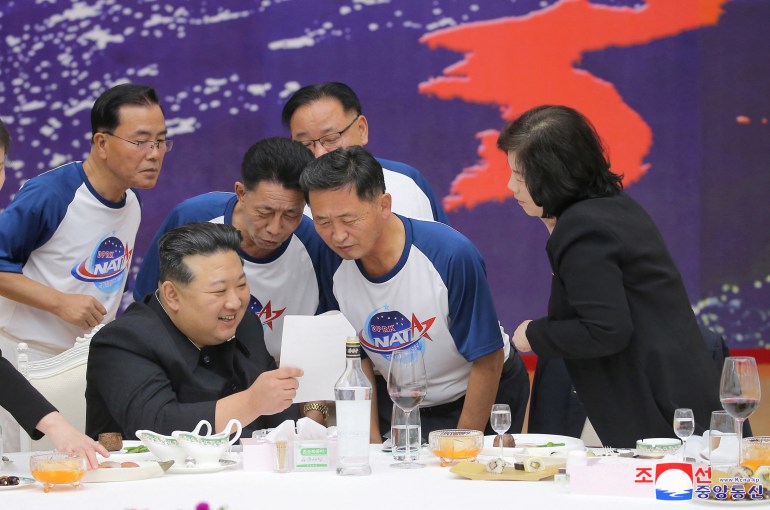State media shows leader Kim Jong Un and his family enjoying a banquet with scientists and engineers involved in the project.
Pyongyang said it successfully launched the satellite, the Malligyong-1, into orbit late on Tuesday, and within hours claimed Kim was reviewing images of United States military bases in Guam.
The launch was “a full-fledged exercise of the right to self-defence,” the official Korean Central News Agency (KCNA) reported Kim as saying during a visit to the national space agency.
The launch was an “eye-opening event” that would help protect North Korea from the “dangerous and aggressive moves of hostile forces” and heralded “a new era of a space power,” he added.
The launch, banned under United Nations sanctions designed to rein in the nuclear-armed country’s ballistic missiles programme, has further ratcheted up tension on the peninsula with Seoul partially suspending and Pyongyang completely suspending the 2018 joint military agreement that was supposed to stabilise cross-border relations.

On Friday, Seoul’s foreign ministry announced that the foreign ministers of South Korea, Japan and China would hold their first trilateral talks since 2019.
The Sunday meeting in the southern port city of Busan will see Park Jin, Yoko Kamikawa and Wang Yi sit down for discussions against the backdrop of Beijing’s growing concerns over Tokyo and Seoul’s deepening security ties with Washington, and the latter’s concerns about North Korea’s continuing military development and its deepening relationship with Russia.
US Secretary of State Antony Blinken has already warned that military ties between North Korea and Russia were “growing and dangerous” after Kim travelled to Russia in September to meet President Vladimir Putin.
Blinken has urged Beijing, Pyongyang’s main ally, to call for some restraint.
At the summit, the foreign ministers “plan to exchange opinions extensively on the direction of development of trilateral cooperation, regional and international situations,” Seoul’s foreign ministry said in a statement.
‘Paternal love’
This week’s launch was the North’s third attempt in six months to put a spy satellite – a priority of Kim’s military modernisation programme – into orbit.
Its earlier efforts in May and August ended in failure.
Images released by North Korean state media on Friday showed Kim, accompanied by his daughter, praising scientists and space programme workers at the National Aerospace Technology Administration (NATA).
Kim was also shown enjoying a reception with NATA workers, top military and political officials and his family.
The attendees, including Kim’s family, wore T-shirts emblazoned with NATA’s logo and “enthusiastically cheered expressing thanks to the great father who finally ensured the successful launch”, KCNA said.
Kim showed “such paternal love for the space scientists,” it added.

Since Tuesday’s launch, South Korea has deployed “surveillance and reconnaissance assets” to the border after partially withdrawing from the 2018 agreement, while Pyongyang has said it will redeploy troops there and suspend the deal in full.
